

When the Gold Bubble Bursted
BY: BG EDITOR
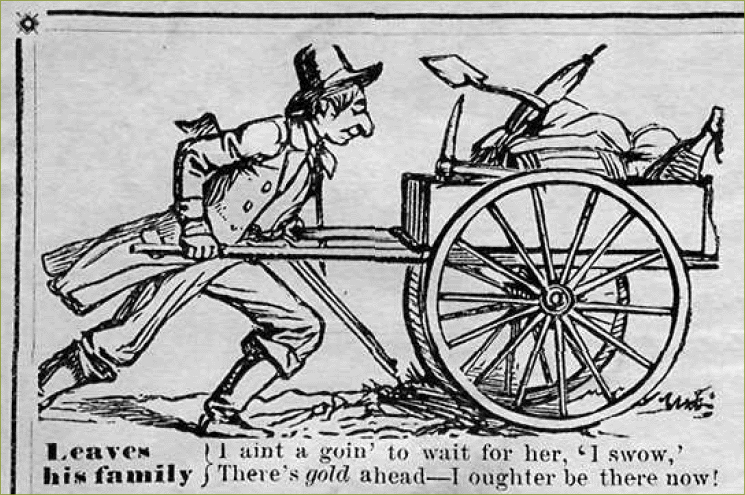
Gold Rush to the Frazer
May 11, 2019 — GREENWOOD, BC (BG)
The illustrated poem below tells the story of those from California who headed north to British Columbia, seeking their fortune in the gold fields. Everyone was 'hot' with gold rush fever, and the temperature rose to bursting. For many, this story came to ground in the Fraser River valley, but we know they were followed by others just like them, who kept moving east and ended up in Greenwood some years later. Either way, the tale of hope and peril is much the same. The history of the Northwest's great gold rush is well described by R. Edward Gosnell in an article entitled Gold: Auri Sacra Fames ("auri sacra fames" means 'greed for gold').
Both the poem and Gosnell's survey mention the good ship Commodore, a steamer out of San Francisco that brought men to Vancouver Island, a drop-off point for the start of their gold explorations. The ship's story is also perilous, as told in fascinating detail by Dave Obee.[1]
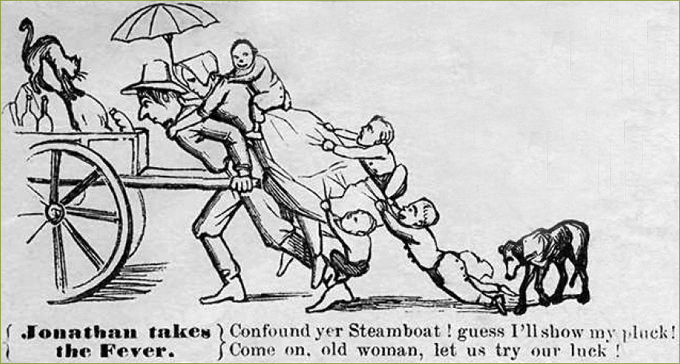
The Frazer River Thermometer
THE BUBBLE BURSTED!!
125° - {Wildest anticipations realized}
At last they've reached the golden ground —
Attained the ladder's highest round,
And here are some things they have found
To check their great ambition;
At hotels they are scarcely fed,
At night they sleep three deep in bed,
The floors are breaking over head,
'Tis a pitiful condition.
So up the river now they go,
The waters high, their spirits low,
They paddle on prodigious slow,
Until their boats go under;
They lose their grub and all they own,
Each one starts off on foot alone,
And toddles toward the Frigid Zone —
The fever cools — no wonder!
The Indians noticed these affairs,
And so did hungry grizzly bears,
And thinking he was donning airs
One seizes hold the coat he wears,
And proves he's "teeth to insert;"
From the dentist bear he starts to run,
The Indians all enjoy the fun,
A race for life is now begun —
He gets away, what a lucky one,
With his scalp and a part of his shirt!
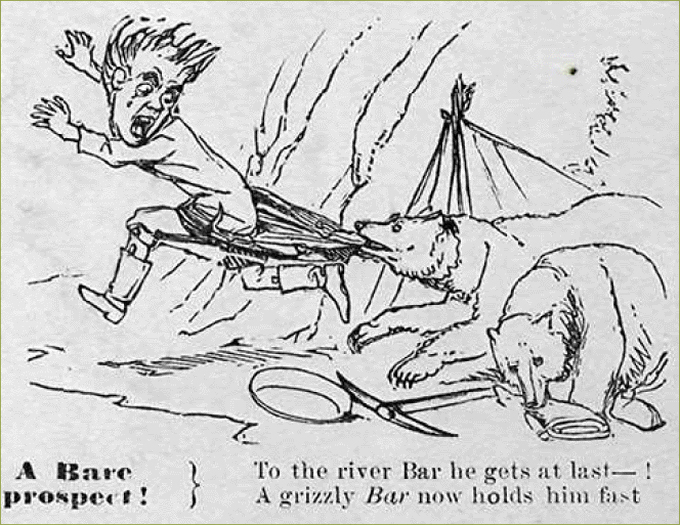
Now, nearly starved, he feels inclined,
His bacon lost, to try and find —
'Tis off he starts and goes it blind,
'Til he stumbles across the bone;
On it, alas, he finds no meat,
The bone is quite too hard to eat,
But still he tries to do the feat,
And complains to himself alone.
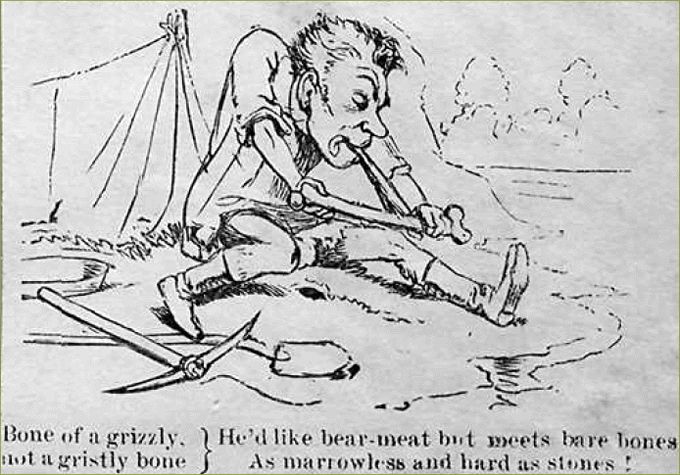
Then memory comes of stories told,
How high and low, the young and old,
Might revel there in Frazer's gold —
And though he's hungry, weak and cold,
With nerve that's strong and heart that's bold,
He waits for water to fall;
He's made his mind he will not flinch,
The water does not fall an inch,
And of gold he cannot get a pinch,
But he's pinched with hunger and all.
And there he waits, like thousands more,
For grub to come in the Commodore.
Which, alas, will never reach that shore,
Though many the boat have trusted;
Like the boat, his hopes are sadly wrecked,
Both cases are of sad neglect,
And neither now can good expect,
Since the bubble, you see, has bursted.
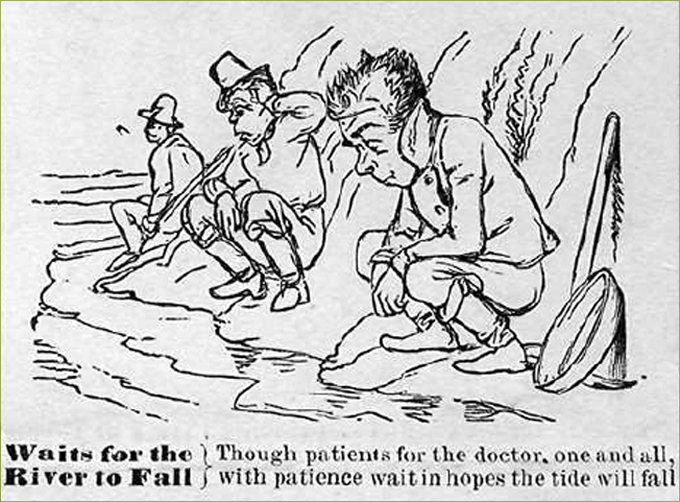
And thousands who have left our State,
And can't get back, now curse their fate,
They're willing to work, at any rate,
For money with which to return;
But many, of their suffrings read,
And give the dismal tales no heed —
With them it is no use to plead,
They're sure that they can strike a lead,
And for the coming time of need
They manifest no concern.
But they find more trouble there than gold,
The water high, the weather cold,
The Indians plenty, fierce and bold,
That grub is not allowed to mould,
That they have been most badly sold
By stories told of Frazer;
They find no chance for building dams,
No food for them but dirty clams,
At Bellingham they find no hams,
For Hope, no hope for pleasure.
Published by Steritt & Butler, San Francisco, 1858[2]
THE BUBBLE BURSTED!!
Attained the ladder's highest round,
And here are some things they have found
To check their great ambition;
At hotels they are scarcely fed,
At night they sleep three deep in bed,
The floors are breaking over head,
'Tis a pitiful condition.
So up the river now they go,
The waters high, their spirits low,
They paddle on prodigious slow,
Until their boats go under;
They lose their grub and all they own,
Each one starts off on foot alone,
And toddles toward the Frigid Zone —
The fever cools — no wonder!
The Indians noticed these affairs,
And so did hungry grizzly bears,
And thinking he was donning airs
One seizes hold the coat he wears,
And proves he's "teeth to insert;"
From the dentist bear he starts to run,
The Indians all enjoy the fun,
A race for life is now begun —
He gets away, what a lucky one,
With his scalp and a part of his shirt!

Now, nearly starved, he feels inclined,
His bacon lost, to try and find —
'Tis off he starts and goes it blind,
'Til he stumbles across the bone;
On it, alas, he finds no meat,
The bone is quite too hard to eat,
But still he tries to do the feat,
And complains to himself alone.

Then memory comes of stories told,
How high and low, the young and old,
Might revel there in Frazer's gold —
And though he's hungry, weak and cold,
With nerve that's strong and heart that's bold,
He waits for water to fall;
He's made his mind he will not flinch,
The water does not fall an inch,
And of gold he cannot get a pinch,
But he's pinched with hunger and all.
And there he waits, like thousands more,
For grub to come in the Commodore.
Which, alas, will never reach that shore,
Though many the boat have trusted;
Like the boat, his hopes are sadly wrecked,
Both cases are of sad neglect,
And neither now can good expect,
Since the bubble, you see, has bursted.

And thousands who have left our State,
And can't get back, now curse their fate,
They're willing to work, at any rate,
For money with which to return;
But many, of their suffrings read,
And give the dismal tales no heed —
With them it is no use to plead,
They're sure that they can strike a lead,
And for the coming time of need
They manifest no concern.
But they find more trouble there than gold,
The water high, the weather cold,
The Indians plenty, fierce and bold,
That grub is not allowed to mould,
That they have been most badly sold
By stories told of Frazer;
They find no chance for building dams,
No food for them but dirty clams,
At Bellingham they find no hams,
For Hope, no hope for pleasure.
Published by Steritt & Butler, San Francisco, 1858[2]
FOOTNOTES:
[1] "Commodore's arrival set the stage" by Dave Obee
http://www.daveobee.com/victoria/20080427.htm
[2] "The Frazer River Thermometer" — Broadside published by Steritt & Butler, San Francisco (1858)
https://open.library.ubc.ca/collections/bcbooks/items/1.0221998#p0z-1r0f:


